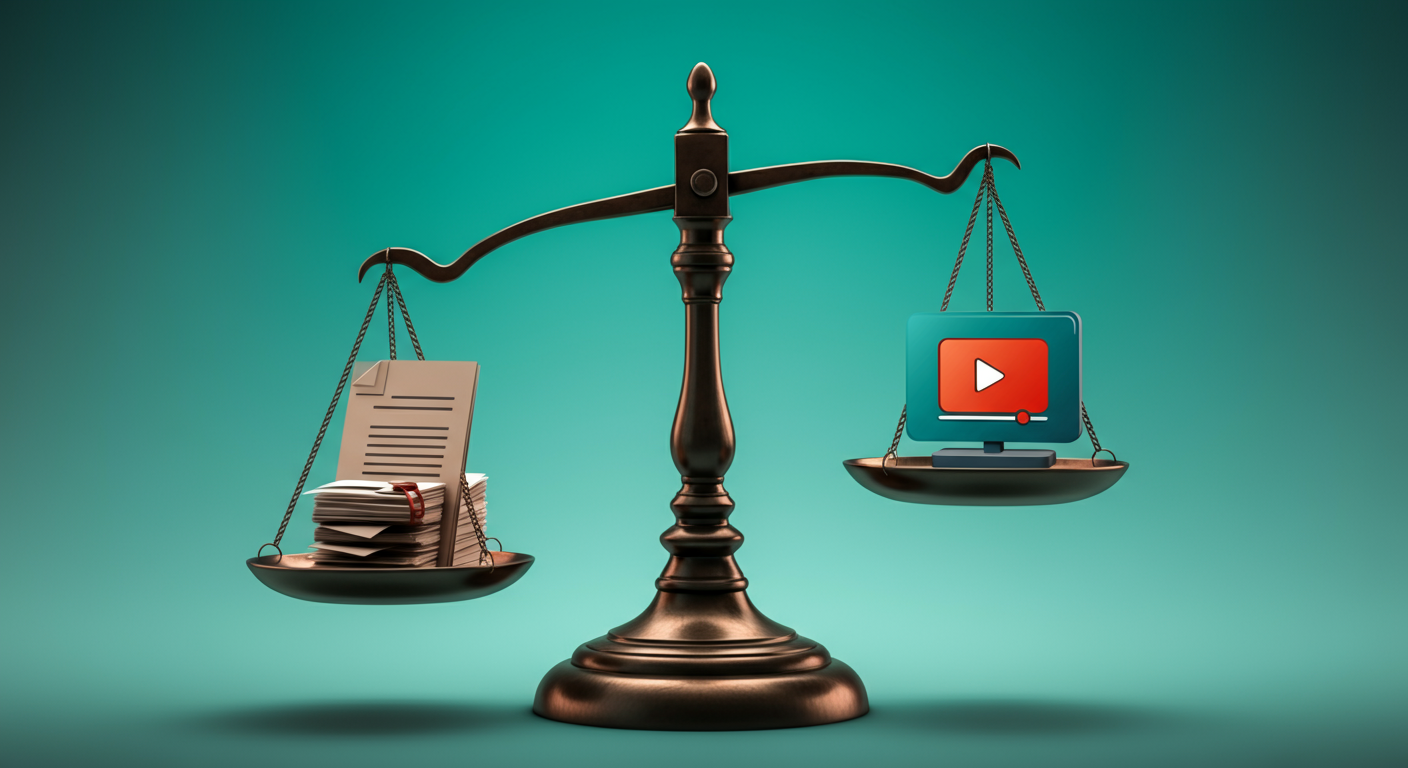In the bustling world of commercial video programming, understanding the legal aspects of video programming can be a daunting task. Whether you’re a business owner in the hospitality industry or a multi-location organization seeking to enhance your customer experience, navigating the complex legal landscape is crucial. With the rise of digital signage solutions and hospitality TV packages, ensuring compliance with licensing and legal requirements has never been more important.
At DLM Media, we recognize the significance of these legal considerations in delivering high-quality commercial entertainment. Our expertise lies in providing businesses with a worry-free experience, ensuring reliable signal delivery and an exceptional viewing experience for customers. As a leader in the field, we are committed to helping you understand and address the legal challenges associated with video programming.
This blog post will guide you through the essential legal aspects of video programming, from licensing agreements to compliance issues. You’ll gain insights into how these factors can impact your business operations and find practical solutions to navigate them effectively. Our goal is to equip you with the knowledge and tools necessary to make informed decisions and enhance your customer experience.
Ready to explore the intricate legal landscape of commercial video programming? Let’s dive in and uncover the key points you need to know.
Understanding Licensing Requirements in Video Programming
In the realm of commercial video programming, licensing plays a pivotal role in ensuring that content is broadcast legally and ethically. For businesses in the hospitality and entertainment industries, understanding the different types of licenses required is crucial to avoid legal pitfalls and ensure smooth operations. This section explores the various licensing agreements and their implications for businesses, providing insights into how they can navigate these requirements effectively.
Licensing agreements are essentially contracts that grant permission to use copyrighted content. These agreements can vary significantly based on the type of content and the intended use. For businesses, it’s essential to recognize the types of licenses they might need and the potential consequences of non-compliance.
Types of Licensing Agreements
Businesses must familiarize themselves with the different types of licensing agreements to ensure they are fully compliant with legal standards. Here are some common types:
- Public Performance License: Required for businesses that play music or videos in public spaces. This license ensures that copyright holders receive compensation for the use of their content.
- Reproduction License: Necessary for businesses that intend to make copies of video content, such as creating promotional materials or internal training videos.
- Synchronization License: Needed when video content is combined with music, such as in advertisements or promotional videos.
- Broadcast License: Essential for television networks and cable providers that distribute video content to the public.
Each of these licenses serves a specific purpose and ensures that businesses can use copyrighted material without infringing on the rights of the content creators.
Impact of Licensing on Businesses
Licensing agreements have a significant impact on how businesses operate. They dictate what content can be used, how it can be distributed, and the costs associated with its use. For instance, a public performance license allows bars and restaurants to play music videos, enhancing the customer experience. However, failure to obtain the necessary licenses can result in hefty fines and legal action, disrupting business operations and damaging reputations.
Moreover, licensing fees can vary based on the type of content and the size of the audience. Businesses must budget for these expenses to ensure they remain compliant and avoid unexpected costs.
Consequences of Non-Compliance
Non-compliance with licensing requirements can lead to severe consequences for businesses. Legal penalties may include fines, lawsuits, and even the revocation of business licenses. Additionally, businesses may face reputational damage, which can impact customer trust and loyalty.
To mitigate these risks, businesses should work closely with legal experts to understand their licensing obligations and ensure they have the appropriate agreements in place. Partnering with a reliable commercial video programming provider, like DLM Media, can also help businesses navigate these complexities and maintain compliance.
By understanding and adhering to licensing requirements, businesses can focus on delivering exceptional customer experiences without the worry of legal repercussions. For more insights into the legal aspects of video programming, explore additional resources on our website.
Navigating Compliance Issues in Video Programming
Compliance with legal standards is a cornerstone for businesses utilizing video programming, especially in the hospitality and entertainment industries. Ensuring adherence to regulations not only mitigates legal risks but also enhances accessibility, thereby broadening audience reach. This section delves into the critical compliance issues that businesses must navigate, with a particular focus on closed captioning and accessibility requirements.
In recent years, there have been significant legal changes impacting video programming compliance. The rise of digital platforms has necessitated stringent regulations to ensure that content is accessible to all individuals, including those with disabilities. Understanding these changes is crucial for businesses aiming to maintain compliance and avoid potential legal pitfalls.
Importance of Closed Captioning
Closed captioning is a vital component of video programming compliance. It provides a visual display of the audio portion of video content, making it accessible to individuals who are deaf or hard of hearing. According to the Federal Communications Commission (FCC), closed captioning is required for all video programming shown on television and subsequently distributed on the internet. This requirement ensures that content is accessible across multiple platforms, enhancing the viewing experience for a broader audience.
Businesses must ensure that their video programming includes accurate and timely closed captions. Failure to comply with these requirements can result in legal penalties and damage to a company’s reputation. As noted by legal experts, “Compliance with closed captioning regulations is not just a legal obligation but a social responsibility.” By prioritizing accessibility, businesses can demonstrate their commitment to inclusivity and customer satisfaction.
Accessibility Standards and Legal Changes
Recent legal changes have reinforced the importance of accessibility in video programming. The Twenty-First Century Communications and Video Accessibility Act mandates that video programming delivered via internet protocol must include closed captions if it was originally aired on television with captions. This requirement underscores the necessity for businesses to stay informed about evolving legal standards and implement necessary adjustments to their video content strategies.
Moreover, businesses must be aware of the deadlines for compliance. For instance, prerecorded programming must be captioned within specific timeframes after being aired on television. Understanding these deadlines is essential for maintaining compliance and avoiding potential fines. Legal advisors emphasize, “Staying ahead of regulatory changes is key to ensuring uninterrupted business operations and safeguarding against legal repercussions.”
Impact on Businesses
The impact of compliance issues on businesses can be significant. Non-compliance with accessibility standards can lead to legal actions, financial penalties, and reputational damage. For businesses in the hospitality and entertainment industries, where customer experience is paramount, ensuring compliance is crucial for maintaining a competitive edge.
By integrating compliance into their operational strategies, businesses can not only avoid legal challenges but also enhance their brand image. Partnering with experienced providers like DLM Media can offer businesses the expertise needed to navigate these complex legal landscapes effectively. As a leader in commercial video programming solutions, DLM Media provides reliable services that help businesses comply with legal requirements while delivering exceptional customer experiences.
For more information on the legal aspects of video programming, explore additional resources available on our website. By staying informed and proactive, businesses can ensure compliance and continue to thrive in the dynamic world of video programming.
Best Practices for Legal Compliance in Video Programming
In the dynamic world of commercial video programming, maintaining legal compliance is essential for businesses aiming to deliver high-quality content while avoiding potential legal pitfalls. By implementing best practices, businesses can ensure they remain compliant with regulations and provide an exceptional viewing experience. This section offers practical advice and strategies to help businesses maintain compliance effectively.
One of the key aspects of ensuring legal compliance is conducting regular compliance audits. These audits help identify any areas where the business may be falling short of legal requirements and provide an opportunity to rectify issues before they escalate. Additionally, staff training plays a crucial role in maintaining compliance. By educating employees about the legal aspects of video programming, businesses can foster a culture of awareness and responsibility.
Regular Compliance Audits
Conducting regular compliance audits is a proactive approach to identifying and addressing potential legal issues. These audits involve a thorough review of the business’s video programming practices to ensure they align with current legal standards. Here are some tips for effective compliance audits:
- Schedule Audits Regularly: Establish a routine schedule for audits to ensure ongoing compliance. This could be quarterly or bi-annually, depending on the size and scope of the business.
- Engage Legal Experts: Collaborate with legal professionals who specialize in video programming to gain insights into complex legal requirements and ensure thorough audits.
- Document Findings: Keep detailed records of audit findings and corrective actions taken. This documentation can serve as evidence of compliance efforts in case of legal scrutiny.
Staff Training and Education
Educating staff about the legal aspects of video programming is vital for maintaining compliance. Well-informed employees are better equipped to adhere to legal standards and contribute to a culture of compliance. Consider the following strategies for effective staff training:
- Regular Training Sessions: Conduct regular training sessions to keep staff updated on the latest legal developments and compliance requirements.
- Interactive Workshops: Use interactive workshops to engage employees and provide hands-on experience with compliance scenarios.
- Access to Resources: Provide employees with access to resources, such as legal guidelines and industry best practices, to support their understanding of compliance issues.
Implementing Compliance Strategies
To effectively implement compliance strategies, businesses should focus on integrating compliance into their operational processes. This involves setting clear compliance objectives and establishing mechanisms to monitor and enforce adherence. Here are some strategies to consider:
- Develop a Compliance Plan: Create a comprehensive compliance plan that outlines the business’s legal obligations and the steps needed to meet them.
- Use Compliance Software: Invest in compliance management software to automate monitoring and reporting, making it easier to track compliance status.
- Continuous Improvement: Regularly review and update compliance strategies to address new legal developments and improve overall effectiveness.
By adopting these best practices, businesses can navigate the legal landscape of video programming with confidence. Ensuring compliance not only mitigates legal risks but also enhances the overall customer experience, positioning businesses for long-term success.
Key Takeaways for Legal Compliance in Video Programming
As the landscape of commercial video programming continues to evolve, businesses must remain vigilant in their understanding of the legal aspects of video programming. Compliance is not just a legal obligation but a strategic advantage that can enhance customer experience and protect your brand. From licensing agreements to accessibility requirements, these legal considerations play a crucial role in how businesses operate and engage with their audiences.
To recap, here are the essential points to consider for maintaining legal compliance in video programming:
- Understand Licensing Requirements: Ensure your business has the necessary licenses, such as public performance and synchronization licenses, to use copyrighted content legally.
- Prioritize Accessibility: Implement closed captioning and other accessibility features to comply with regulations like the Twenty-First Century Communications and Video Accessibility Act.
- Conduct Regular Compliance Audits: Regularly review your video programming practices to identify potential compliance issues and rectify them promptly.
- Invest in Staff Training: Educate your team about the legal requirements and foster a culture of compliance within your organization.
Now is the time to assess your current compliance status and take proactive steps to address any gaps. By doing so, you can avoid legal pitfalls and focus on delivering exceptional entertainment experiences to your customers. If you’re unsure about your compliance status, consider seeking professional advice or partnering with experts like DLM Media, who can guide you through the complexities of video programming compliance.
We encourage you to explore additional resources on our website to further enhance your understanding of the legal aspects of video programming. By staying informed and proactive, your business can thrive in the competitive world of commercial entertainment.





